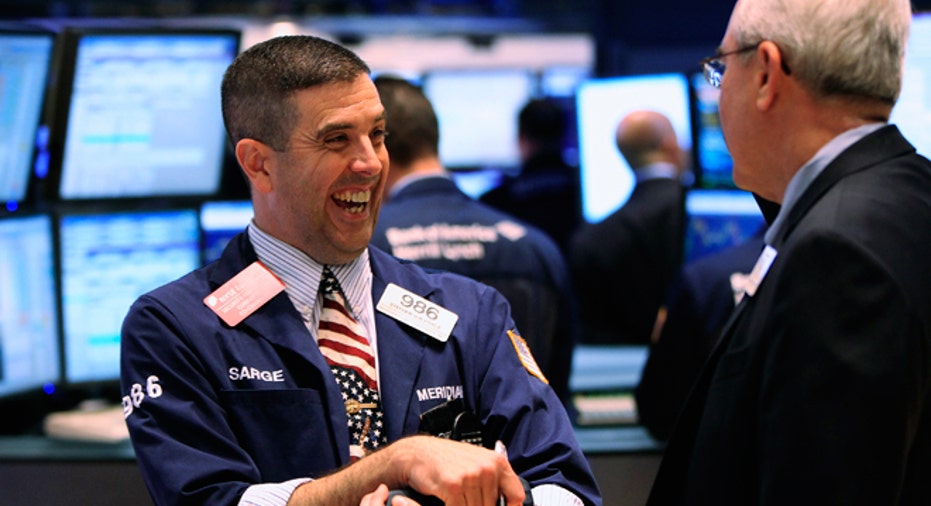Bulls Extend Run as Dow Charges Past 14K for First Time Since '07

FOX Business: Capitalism Lives Here
On the back of its best January in nearly two decades, the Dow launched past the 14000 mark for the first time since 2007 Friday amid growing optimism the global economy is picking up steam.
Today's Markets
The Dow Jones Industrial Average rallied 149 points, or 1.1%, to 14010, the S&P 500 rose 15.1 points, or 1%, to 1513 and the Nasdaq Composite advanced 37 points, or 1.2%, to 3179.
Wall Street kicked off the year in rally mode, with the broad S&P 500 posting its best January since 1997. Now, on the first trading day of February, the Dow Industrials notched its highest closing mark since October 2007.
'Jobs Market Looks a Lot Healthier'
The Labor Department said U.S. nonfarm payrolls rose by 157,000 in January from December, slightly below the 160,000 expected. The unemployment rate ticked up to 7.9% from 7.8% the month prior. December's payroll increase was revised up to 196,000 from a previously reported 155,000, while November's was bumped up to 247,000 from 161,000. As a result of revisions, the average job-growth rate was revised up to 180,000 from 153,000 for 2012.
“All of the sudden, the jobs market looks a lot healthier … than it did at 8:29 this morning. The economy has a lot more momentum, and companies are doing a lot more than we thought they were,” Deutsche Bank Chief U.S. Economist Joseph LaVorgna said. “We’ve had a pattern of consistent upward revisions, it was in place last year, and became even more pronounced with today’s numbers.”
In his view, the Fed’s aggressively accommodative monetary policy is “completely mis-aligned for where the economy is headed.” Although, he added the higher pace of payroll gains probably won’t do much to take the Fed’s foot off the gas, noting the central bank will probably “hide behind” the unemployment rate.
Weigh In: Is Wall Street Getting Ahead of Itself?
Chris Williamson, chief economist at market data company Markit, also noted that the January data provided "reassuring evidence that the U.S. is not falling back into recession," on the heels of an unexpected drop in fourth-quarter gross domestic product.
'Incredibly Encouraging' Manufacturing Report
Among the other reports, one from the Institute for Supply Management showed the U.S. manufacturing sector growing at its fastest clip since April. The ISM PMI gauge jumped to 53.1 in January from 50.2 in December, topping an expected reading of 50.6. Readings above 50 point to expansion in the sector, while those below point to contraction.
"Along with the (PMI) index’s jump in January, it suggests that the broader economy was not meaningfully hurt in the last few months because of the ongoing debate in Washington," Dan Greenhaus, chief global strategist at BTIG wrote in an email. "That is incredibly encouraging and implies that further contraction at the federal level – assuming the sequestration takes effect – will not have as much of an effect on the private economy as some expect."
A final reading on U.S. consumer sentiment came in at 73.8 for the month of January, up from a preliminary reading of 71.3 and higher than the 71.5 expected, according to a survey by Thomson Reuters and the University of Michigan.
Global Factory Sectors Continue to Recover
Earlier, traders received two reports from China, the world's No. 2 economy. An official government report on its manufacturing sector showed the pace of expansion there unexpectedly ticking lower in January. However, a private survey from HSBC actually showed the factory sector revving up at its fastest pace in two years.
"The mixed signals cast some doubt on the strength and sustainability of the recovery," Zhiwei Zhang, an economist at Nomura wrote to clients. However, Hongbin Qu, HSBC's chief economist for China, wrote in a statement that "we see increasing signals of a sustained growth recovery in the coming months," noting several positive factors there.
Meanwhile, the eurozone's factory sector contracted at its slowest pace in 11 months in January, according to a report from Markit, suggesting the currency bloc continues bouncing back from the debt crisis. Germany, the biggest European economy, saw its slowest rate of contraction in 11 months. However, France, the second-biggest economy, saw its steepest contraction in four months.
On the corporate front, Merck (NYSE:MRK) revealed quarterly results that topped Wall Street's expectations, but the pharmaceutical giant's full-year outlook came at the low range of estimates. ExxonMobil (NYSE:XOM), the world's biggest publicly-traded energy company, beat estimates on the bottom line,and saw its top line come essentially inline.
Commodities were broadly higher. The benchmark U.S. contract rose 38 cents, or 0.38%, to $97.87 a barrel. Wholesale New York Harbor climbed 0.64% to $3.051 a gallon. In metals, gold advanced $10.20, or 0.61%, to $1,672 a troy ounce.
Foreign Markets
The Euro Stoxx 50 rose 0.26% to 2710, the English FTSE 100 gained 1.1% to 6347 and the German DAX advanced 0.47% to 7833.
In Asia, the Japanese Nikkei 225 edged up by 0.47% to 11191 and the Chinese Hang Seng slipped 0.03% to 23722.
Follow Adam Samson on Twitter @adamsamson.



















